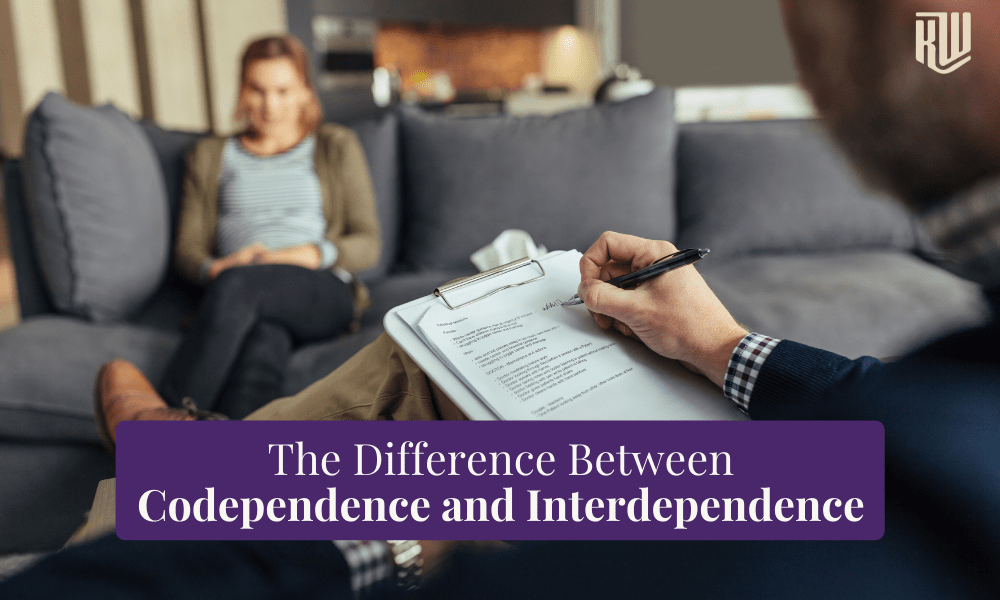The Difference Between Codependence And Interdependence
The question ‘What is the difference between codependence and interdependence?’ In reality, it asks whether a relationship is dysfunctional or healthy. Well, in today’s Best Day Blog, I will be taking you through the differences between the two and how to recover from codependency.
Dysfunctional Relationships
I talk a lot about what dysfunctional relationships can look like, but how do you develop a healthy relationship, and what does a healthy one look like? Unfortunately, the idea of relationships we all grow up with from movies and TV is unhealthy. The relationships shown are romanticized, often codependent and dysfunctional. Because of how relationships are displayed to us through the media and our own experiences growing up, I believe we are all codependent. Therefore, it’s nothing to feel ashamed of, but now is the time to learn and grow. So, let’s dive into what codependency and interdependence actually look like so that you can begin your journey.
Codependence
How society creates codependence
It is the loss of individuality. So often, the message we receive about love is that we must give up everything to make it work, including parts of ourselves. In particular, in reality, TV shows and on social media, there is a message being portrayed that real love only exists when both people in a relationship are completely and utterly devoted to every need and want of their significant other. They believe that each of them is on a pedestal and admired rather than respected and dependent outside of the relationship and inside. This creates codependency and is often a total melting of personalities into one unified soul. While building a solid bond is crucial, there is a distinction between that and the toxic nature of codependency.
How the words should and could are a sign of codependence
The words ‘should’ and ‘could’ are clear signs of codependency. You’ll notice that many people who speak about relationships, i.e., relationship coaches or experts, will say things like ‘Your man should be doing this for you’ or ‘She could do more!’ but what this is, is a denial of reality. It is a lack of acceptance for who the person is by asking them to be someone or do something that isn’t what’s happening. So now, you are not accepting your partner as themselves and instead forcing them to be something they are not.
Acceptance of your partner’s (or friends’) perfect imperfections shows interdependence, but a sense that they ‘should’ or ‘could’ be doing something else, is codependent. If you’re unable to stop doing this, then it’s time to look back at yourself and ask, ‘Why am I unable to accept the reality of my partner? Why am I trying to get them to change?’. This may be difficult as it may cause realizations that the partner or friend you picked is not who you desire to be with, but it’s better to own this truth than live in denial and try to force them to be who they are not.
The inability to accept the truth and perfect imperfections
The idea that your partner has to ‘have your back’ at all times is codependent. Again, this is a ‘should’ belief that they ‘should’ be there to support you always. However, asking this of them is forcing them to abandon themselves completely. When we demand someone to have our back at all times, we are requesting that they be complicit in our perfect imperfections rather than holding us accountable, which, in truth, is the more loving thing to do. When we can take ownership and get into reality about the demands we are placing on others, we can recognize that we are codependent and make changes to heal ourselves and our relationships.
One of the most significant hallmarks of codependence is an inability to accept the truth and reality that we are all perfectly imperfect. Doing so moves us into interdependence.
Interdependence
Making relationship deposits
Rather than always relying on your partner to have your back or be a mind-reader, in an interdependent relationship, both parties make ‘relationship deposits’ into the shared loving space that supports one another. This loving space is created and added to when you enjoy doing certain hobbies together or spend time together doing things you both want to do.
Importantly, in an interdependent relationship, you are also able to choose to do something that your partner wants to do, even if you may not particularly feel as though you want to, from a place of wanting to make a loving deposit, rather than an expectation from your partner that you ‘should,’ just because they want you to. In other words, codependence says, ‘I don’t care whether or not you want to do it. You SHOULD do it with me anyway if you love me,’ and interdependence says, ‘I am choosing to do this with you because I want to make a loving deposit to this relationship.
The importance of knowing our morals, values, needs, wants, negotiables and non-negotiables
We all have our morals and values, needs and wants, negotiables and non-negotiables. While many believe they know what theirs are, they do not. This intense process requires skills we have never been taught. If you have not done the work to lay out what yours are, then it is likely, you won’t be able to have a successful, interdependent relationship. Fortunately, I have produced a three-part video series on my Youtube channel.that walks you through the complete process
In a healthy, interdependent relationship, the morals and values, needs and wants, and negotiables and non-negotiables of both people are understood by each side, and the boundaries around these are honored to create a relationship that supports, rather than expects. An interdependent person will be comfortable sharing them because they aren’t afraid of being rejected or abandoned. In contrast, a codependent person will use manipulation and a lack of boundaries to keep their partner close to them, in spite of what their partner wants or needs themselves.
Also, an interdependent person is comfortable admitting and owning their perfect imperfections because they recognize that we are all human, we all make mistakes, and we all can inadvertently cause hurt and pain to others. A surefire sign of codependency is not being able to admit their flaws for fear of being shamed, abandoned, or rejected.
Again,the secret to interdependence is to get into reality and begin to admit to our flaws and perfect imperfections.
Interdependence recognizes we can only promise today.
Interdependent, emotionally healthy mature adults recognize that we can only promise a person today. This isn’t to say they won’t be committed. However, an interdependent person will wake up each day and ask themselves, ‘Am I still in this relationship from a place of will?’. ‘Am I willing to make relationship deposits?’ In a mutually interdependent relationship, the other person will recognize and accept this truth rather than trying to force the relationship to continue.
The interdependent recognizes you can not control how someone thinks, feels, or believes, and to do so is a fruitless and abusive act. Interdependent people accept that thoughts and beliefs can change. They don’t live in delusion or expect a person never to change or develop new morals, values, needs and wants, negotiables and non-negotiables.
Therefore, if a relationship doesn’t work out, it is not solely the other person who is to blame. They accept that both people in a relationship are responsible for a relationship breakdown. That is why they look to own their part first instead of blaming others. For instance, this relationship would have never started if I had not chosen to allow this person into my life. They take responsibility for that truth and begin working to unpack what they need to heal themselves.
Solutions
1- Sadly, much of the information about codependence is missing a vital part – that of the falsely empowered codependent, not just the disempowered we are all familiar with. The authority on this topic is Pia Mellody. Her books, ‘Facing Codependence’ and ‘Facing Love Addiction’ will provide you with the most complete understanding of codependency. When you want to learn what a healthy interdependent relationship looks like, I suggest her book, ‘Intimacy Factor..’ I believe her three books are required before ever pursuing any relationship. I would love to see them as required reading in schools. I believe they are that important.
2- I suggest my book ‘Your Journey to Success‘ because this will help you to learn about the worst day cycle and how we all have unhealed childhood trauma, which creates our codependence.
3- I suggest subscribing to my Youtube Channel and watching the following three videos.
4- Make sure you also take advantage of these FREE downloads I have created to help you:
How To Remove Felling Rejected.
How To Heal From Codependence Questionnaire
How To Keep Our Boundaries In 3 Simple Steps
Create Lasting Love And Conquer Confrontation
How To Heal From Codependence- Giving The Pain Back
5- For those who are ready to develop a healthy, loving, interdependent relationship free of codependence, I also have this masterclass, ‘The Complete Journey To Create Lasting Love And Connection,‘
6- In most cases, healing codependence and developing deep interdependent love and connection requires professional help. I work with clients all across the world to achieve this. You can schedule your appointment with me today here: Private Coaching session.
To learn more, watch the full video here:





